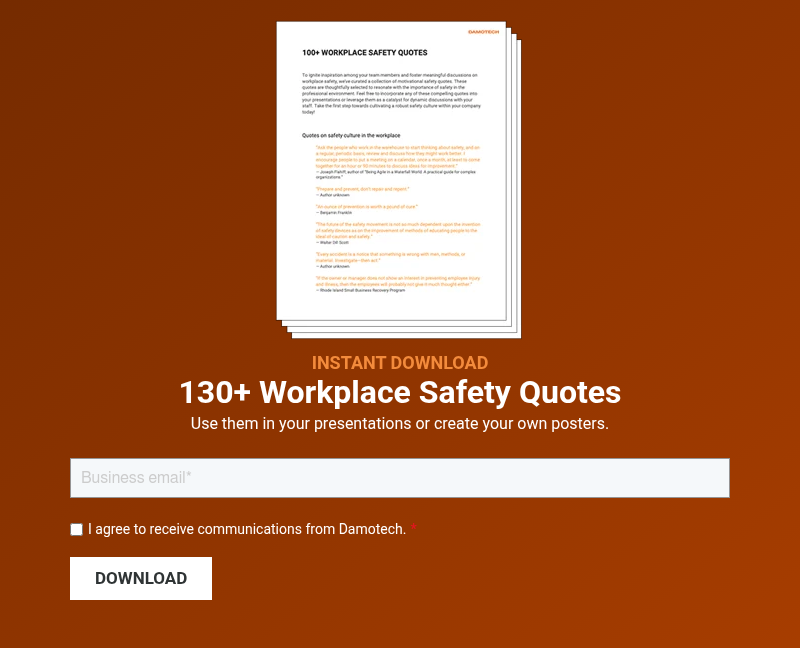Warehouse management is essential to the success of any supply chain operation. It requires a wide range of soft and technical skills to ensure the warehouse runs efficiently and productively.
The Warehouse Manager's Role in Safety Leadership
A warehouse supervisor’s role is to oversee the day-to-day operations of the warehouse. It includes managing inventory storage, tracking, and shipping and ensuring the warehouse’s and its employees’ safety.
A warehouse manager needs various skills, including technical knowledge, leadership, and problem-solving abilities, to excel in this role. This article will discuss the 10 key warehouse management skills and attributes essential for warehouse managers. It will also provide tips and strategies to help them succeed in their job function.

1- Manager Leadership and Communication Skills
Strong leadership skills are essential for creating a positive work environment and fostering a culture of accountability and teamwork.
A warehouse manager must be able to lead and motivate a team of employees. It includes giving clear instructions, delegating tasks, and providing feedback and coaching to team members.
Clear and effective communication with employees at all levels, including those with limited experience, is essential. Everyone must understand their roles and responsibilities and be informed of changes and updates. They should also be able to communicate effectively with other departments and stakeholders within the organization.
Practical tips and skills for overcoming challenges in warehouse leadership and communication:
- Lead by example and set the standard for the work ethic that they expect from their team.
- Hold regular meetings to discuss progress and address any issues.
- Encourage open and honest communication among their team members.
- Communicate clearly and in a way that is easy for everyone to understand.
- Analyze data to track progress and make informed decisions.
DISCOVER DAMOTECH’S RACK SAFETY FLYWHEEL:
ENSURE THE SAFETY OF YOUR WAREHOUSE,
YOUR EMPLOYEES AND YOUR ASSETS.
2- Supervisor Time Management and Organization Skills
A warehouse manager must be able to stay organized, prioritize tasks, and schedule work to meet deadlines. Keeping detailed inventory and shipment records is important to ensure the warehouse runs smoothly.
It is essential to manage their time to complete tasks on time effectively. Delays could negatively impact customer service levels or lead to unnecessary costs.
Practical tips and skills for overcoming challenges in time management and warehouse organization:
- Set realistic and measurable goals and develop a plan to achieve them.
- Prioritize and delegate tasks to warehouse team members.
- Use technology like project management software to track progress and stay organized.
- Create a schedule or calendar of tasks and deadlines.
- Keep detailed records of inventory, shipping, and receiving.

3- Warehouse Manager Problem-Solving Skills
A warehouse manager must be able to think on their feet and come up with solutions to problems. It includes identifying problems, such as inventory shortages or equipment breakdowns, evaluating possible solutions, and implementing the best action.
Practical tips and skills for overcoming challenges in problem-solving:
- Foster a culture of continuous improvement.
- Encourage their team members to share their ideas.
- Be open-minded and willing to try new methods.
- Use data to evaluate the effectiveness of different solutions.
- Stay up to date with industry best practices and new technologies.
4- Warehouse Manager Interpersonal & Social Skills
A warehouse manager must build positive relationships with employees, customers, and suppliers. It includes negotiating and resolving conflicts and providing excellent customer service.
Strong social skills are essential for managing relationships with suppliers and customers and fostering a culture of teamwork and collaboration.
Practical tips for overcoming challenges in interpersonal and social skills:
- Build trust with their team members by being honest and transparent.
- Encourage open and honest communication among their team members.
- Listen actively and be open to feedback.
- Be approachable and available for their team members.
- Encourage team members to participate in decision-making.

5- Warehouse Manager Analytical Skills
A warehouse manager must be able to collect, analyze, and interpret warehouse-related data and make informed decisions.
They must be able to analyze merchandise inventory levels, shipping and receiving data, worker performance data, and other logistics-related issues. Strong analytic skills are essential to identify trends and patterns, helping to optimize operations.
Practical tips for overcoming challenges in analytical skills:
- Use data to evaluate the performance of the warehouse.
- Use technology such as data visualization tools to make sense of data.
- Benchmark performance against industry standards.
- Continuously seek opportunities to improve.
- Use key performance indicators (KPIs) to measure performance and identify areas for improvement.

6- Warehouse Operator Technical Knowledge of Warehouse Operations
A warehouse manager should understand warehouse operations’ technical aspects, including layout. For example, efficient transportation of materials within a warehouse requires a well-planned layout.
It’s also essential to have a solid understanding of the products and equipment stored in the warehouse. It includes knowing how to optimize the flow of goods, create an ergonomic working environment, and use space effectively.
Effective warehouse management also includes material handling, like moving and storing material and using equipment such as forklifts, conveyors, and cranes. To master material handling, they should know the different types of equipment, their capabilities, and how to operate them.
Practical tips and skills for overcoming challenges in technical knowledge:
- Keep up with new technologies and warehouse trends to remain competitive.
- Provide training to employees on the use of equipment and software.
- Have a plan in place for the maintenance and repair of equipment.
- Use technology such as warehouse management systems to track products and equipment and optimize the flow of goods.
- Use vertical space, such as high-density storage systems, to maximize storage capacity.
7- Knowledge of Inventory and Warehouse Management Systems (WMS)
A warehouse manager must understand inventory management principles to maintain an efficient supply chain.
They oversee the movement of goods in and out of a warehouse, manage inventory levels, and implement inventory control systems.
Effective inventory management includes forecasting demand and ensuring correct product placement. It also means understanding the different inventory management systems or software available and using them effectively.
Practical tips and skills for overcoming challenges in inventory management:
- Conduct regular physical inventory counts to ensure accuracy.
- Implement an inventory management system that tracks inventory levels in real-time.
- Implement a warehouse management system (WMS) to optimize pallet placement.
- Create a reorder point system to know when to reorder items as necessary.
- Use barcode scanning or radio-frequency identification (RFID) technology to automate inventory tracking.
- Analyze inventory forecasting data to identify patterns, anticipate demand changes, and adjust inventory levels accordingly.
8- Warehouse Supervisor Knowledge of Pallet Rack & Employee Safety
A warehouse manager should understand racking safety. Pallet racks within a warehouse must be safe and secure for workers.
Being familiar with OSHA regulations and industry best practices for pallet rack safety is important. They should offer employee training on proper usage and maintenance of the racking systems and schedule regular safety inspections.
They should know the different types of racks and their capabilities. It includes ensuring adequate load distribution, inspecting racks for damage, and planning for repairs or replacements of damaged components.
Additionally, they should establish a system to monitor the racks’ condition and implement safety measures to protect workers.
Practical tips and skills for overcoming challenges in pallet rack safety:
- Conduct regular safety inspections of pallet racks and ensure any missing, damaged, or unstable rack components are repaired or replaced.
- Ensure that pallet racks are maintained.
- Schedule yearly inspections with a rack safety expert.
- Train employees on the proper use and loading of pallet racks.
- Use load capacity labels and warning signs to prevent overloading racks.
- Implement safety measures such as rack guards, aisle protectors, and safety netting to prevent accidents and injuries.
9- Manager Knowledge of Logistics and Supply Chain Operations
A warehouse manager should understand logistics and supply chain management, including how goods are received, stored, and shipped and the different transportation modes. Effective logistics planning and coordination can help reduce transportation costs, improve delivery times, and ensure that products are in good condition.
This knowledge is essential for making informed decisions about transportation, warehousing, and distribution and addressing bottlenecks and ineffective processes. Effective supply chain management can help reduce the risk of stockouts and overstocking, leading to lost sales and increased costs.
Practical tips and skills for overcoming challenges in logistics and supply chain operations:
- Streamline shipping and receiving processes to track goods and document processes.
- Use real-time inventory tracking and visibility tools to monitor the progress of shipments and ensure on-time delivery.
- Establish a robust disaster recovery plan to minimize disruptions.
- Ensure compliance and invest in employee training.
- Use a transportation management system (TMS) to optimize logistics and reduce transportation costs.
- Develop a network of reliable carriers and vendors and use their feedback to improve transportation logistics.
10- Superior Knowledge of Warehouse and Racking Regulations
A warehouse manager must understand safety regulations and best practices to ensure a safe working environment for employees. Not complying with safety regulations and laws can result in hefty fines and legal penalties.
A warehouse manager should prioritize safety by handling equipment safely, identifying hazards, and preventing accidents and injuries. They should also ensure safe storage and handling of products, have emergency procedures in place, and provide proper training and equipment to workers.
Practical tips and skills for overcoming challenges in safety regulations:
- Regularly conduct safety audits and address any hazards identified.
- Train their team on properly using the equipment and safe work practices.
- Encourage employees to speak up if they see a potential safety hazard.
- Stay current with OSHA regulations and industry best practices for warehouse safety.
- Have a plan in place for emergencies.
- Use visual cues like floor markings and signage to guide workers and improve navigation.
- Use a safety management system to keep track of safety compliance and training.
- Implement a safety incentive program to encourage workers to maintain a safe working environment actively.
ARE YOU TRAINED IN WAREHOUSE SAFETY?
HELP YOUR WORKERS UNDERSTAND THE POTENTIAL HAZARDS AND KNOW THE STEPS TO TAKE WHEN DAMAGE OCCURS.
Key Takeaways on Warehouse Manager Skills Requirements to Succeed
In summary, a warehouse manager is crucial in ensuring efficient warehouse operation. To succeed, warehouse managers must possess technical, operational, and leadership skills to ensure efficiency and productivity.
As a reminder, here are some of the key warehouse manager skills and knowledge highlighted in this article:
- Leadership, communication, and interpersonal skills
- Time management and organization skills
- Problem-solving and analytical skills
- Knowledge of inventory management, logistics, and supply chain operations
- Knowledge of safety regulations and pallet racking systems
By proactively identifying potential challenges in each of these areas and implementing practical solutions, warehouse managers can ensure their warehouse’s smooth and safe operation while meeting the needs of their customers and organization.

FAQ: Skills Every Warehouse Manager Needs to Succeed
What are the most critical skills for a warehouse manager today?

How does leadership actually impact warehouse safety and performance?

What meetings and cadences work best for team communication?

Which time-management techniques help most on the floor?

What KPIs should a manager track to stay analytical (not just reactive)?

What “technical knowledge” matters most for warehouse operations?

How should managers use a WMS (or inventory tools) to prevent stockouts and excess?

What are practical steps to strengthen pallet rack & employee safety?

Which logistics and supply chain decisions sit with the warehouse manager?

How can managers keep up with OSHA and racking standards without drowning in paperwork?

What training rhythm actually moves the needle?

How do I build interpersonal trust with a multi-language, multi-shift team?

When should I bring in outside experts?













